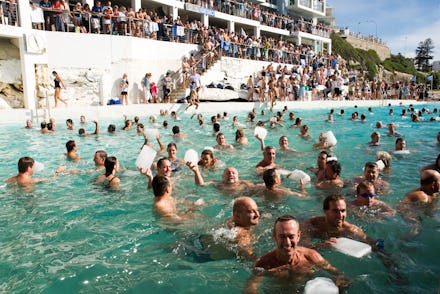This Will Make You Never, Ever Want to Go in a Swimming Pool Again

You're swimming in your own — and, more disgustingly, everyone else's — shit.
The bad news: When you enter a pool, the stuff we carry on our bodies, from skin and hair products to urine and poop (yes, poop), neutralizes the water's bacteria-killing chlorine. The result? Survivor germs, which when swallowed or inhaled, cause about 10,000 illnesses a year.
But what about all that chlorine you smell in the pool? Isn't that supposed to kill all the germs?
Nope. As it turns out, a healthy pool doesn't smell at all. Instead, what you're sniffing is the product of a chemical reaction between what we transport into the pool on our bodies and chlorine. The nitrogen in all of those products effectively cancels out the germ-slaughtering properties of our chemical ally. This same chemical reaction is also responsible for producing the eye-stinging irritant we commonly associate with plain old chlorine.
At the mercy of your fellow swimmers: During a swim, you and your water-clogged friends can lose as much as one to two soda cans' worth of sweat, and 1 in 5 swimmers relieve themselves in the water (regardless of what they say). That's a lot of "body matter" to leave behind.
When the germs inside those fluids hang around in the pool, they can make us sick. The Centers for Disease Control and Prevention has a category for the types of illnesses brought on by a dip in a public pool. Recreational water illnesses (RWIs) are every bit as nasty as they sound, and include infections of the skin, intestinal tract, ear and eyes. Swallowing pool water is especially dangerous, since many illnesses, including diarrhea (the most common RWI) enter the body this way. This is especially alarming considering that reported cases of cryptosporidiosis, the parasite that causes diarrhea, jumped 200% between 2004 and 2008, from 3,411 cases to 10,500.
Image Credit: Centers for Disease Control and Prevention
There's a quick and easy solution: A quick rinse gets rid of most surface germs, makeup, urine and feces, according to a 2012 study in Water Research. Yet 7 out of 10 swimmers don't shower before taking a dip. Thankfully, places like Hennepin County in Minnesota are taking note and making a pre-swim rinse-off a requirement for bathers.
If more public health departments made showers mandatory, it would go a long way in helping everyone avoid everyone else's germs. And public knowledge about the problems associated with relieving oneself in the pool could also help to stop people from taking a leak in what is really a giant communal bathtub.